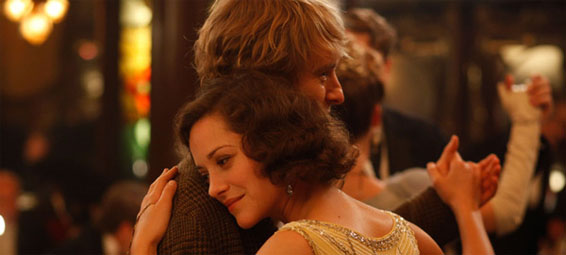Woody Allen is someone for whom only a certain kind of city makes sense to live in. The filmmaker, whose character in Annie Hall famously swears off Los Angeles, drives his movies with individuals who are creatures of their environment — and that environment is New York. You might argue that Woody Allen’s New York is a city that has since faded away, given over to an elite playground-city fueled by Wall Street cash, or that Allen’s city was always a romanticized ideal of a place that never quite existed except in the minds of Woody Allen’s characters. Indeed, it is the sense that we are both products and lovers of romanticized environs that has always haunted Allen’s films.
In his latest movie, Midnight in Paris, this urban love is the central theme. A love song to the City of Light, Midnight in Paris opens with a long series of postcard shots, lovely images of the French city in motion that immediately prick the nostalgia of any Euro-loving viewer. This travel brochure sequence also tells us that the Paris that Allen is interested in is not the gritty urban menagerie of a Michel Tournier novel, but the shimmer lover-city of Hemingway’s A Moveable Feast. His view is unapologetically nostalgic, and yet, dressed with the director’s characteristic wit and psychological brilliance, the movie reminds us that few directors could handle this kind of sentimentality with such appealing sensitivity and charm.
At the center of this Parisian love story is Gil (Own Wilson), a struggling, semi-neurotic writer who is in the City of Light with his fiancée Inez (Rachel McAdams) and her wealthy family. As they wander the streets picking out wedding gifts, Gil is given to pining soliloquies about the romance of Paris and how he believes the city could make him a better writer. The couple happens to bump into a pair of old friends, the academic Paul (Michael Sheen) and his girlfriend Carol (Nina Arianda). A typical Allen kind of fall guy, the arrogant, erudite scholar grates on Gil, but woos Inez. In a series of well-played leisurely conversations, Paul is hilarious picture of pomposity as he wedges himself between the soon-to-be newlyweds.
One night after dinner, when Gil awkwardly declines an invitation to go out dancing (an invitation his fiancé nonetheless accepts), the American finds himself wandering the empty streets of Paris alone. He sits on some church steps on some forgotten corner, and the church bells strike midnight. Around the corner rears a 1920s coupe which screeches to a halt, its passengers calling for Gil to jump in the car. The writer has suddenly shown up in the Paris of his dreams: the ideal place at the ideal time, Paris populated with characters like Ernest Hemingway, F. Scott Fitzgerald and his wife Zelda, Cole Porter, Gertrude Stein, Pablo Picasso, Salvador Dali, Luis Buñuel, and others.
Allen’s magical-absurdist set-up is at once a shameless excuse to re-imagine grand life at a paramount moment of cultural ferment, and a metaphor for the romantic mind, which always imagines itself ostracized from a better life, a better time to live, and a better place to live. Much of the humor of Midnight in Paris comes through its knowing portrayals of the literary giants. Hemingway (Corey Stoll), with his gruff, non-nonsense boyishly bullying manhood complex, is particularly amusing. Adrien Brody plays up the eccentric surrealist Salvador Dali with deft flair. And surrounded by eccentrics, Owen Wilson must hold this show together, which he manages to pull off without allowing his golly-gee, slack-jawed amazement to descend into shtick.
Night after night, Gil continues to return to the Paris of his dreams, and with each amazing sojourn, his relationship with his fiancée becomes unmoored. In 1920s Paris, he falls for Pablo Picasso’s mistress and discovers a world of artists uncompromised by practicalities. As time goes on, you wonder if Gil will ever return to reality — or perhaps what he has found is something more real than reality.
Despite all the fun and games of Allen’s imagined Paris, there is a soft, elderly wisdom to Midnight in Paris, a keen appreciation for a kind of disposition of the world. It is a movie about the foolishness of lovers, not only those who fall for people, but those foolish enough to fall for places, ideals, and dreams. In typical, self-deprecating Allen fashion, on the one hand the director seems to be apologizing, admitting that this dreaming is all very silly. But with the same swipe the filmmaker is still trying to tell us that this foolish love is the only existential sweetener that he has found to make life worth living at all. And as we watch the evening rain pour down on Wilson and a new love interest on a bridge over the glistening Seine, who’s going to argue?





